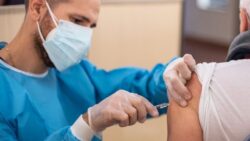The American made Covid vaccine made by Pfizer, the American company has been approved for use in the UK. The stock markets have rallied since the news of the vaccine.
The UK has become the first country in the world to approve the Pfizer/BioNTech coronavirus vaccine for widespread use.
British regulator, the MHRA, says the jab, which offers up to 95% protection against Covid-19 illness, is safe for rollout.
MHRA Chief Executive Dr June Raine said: “We are pleased to have received the letter from the Department of Health and Social Care requesting a review of the Oxford/AstraZeneca COVID-19 vaccine candidate.
What is the Vaccine?
It is a new type called an mRNA vaccine that uses a tiny fragment of genetic code from the pandemic virus to teach the body how to fight Covid-19 and build immunity.
An mRNA vaccine has never been approved for use in humans before, although people have received them in clinical trials.
Around 10m doses should be available soon, with the first doses arriving in the UK in the coming days.
It is the fastest ever vaccine to go from concept to reality, taking only 10 months to follow the same developmental steps that normally span a decade.
Although vaccination can start, people still need to remain vigilant and follow coronavirus rules to stop the spread, say experts.
That means sticking with the social distancing and face masks and testing people who may have the virus and asking them to isolate.
The Side effects of the Vaccine
There are still many unanswered questions as this is only interim data.
We do not know if the vaccine stops you spreading the virus or just from developing symptoms. Or if it works equally well in high-risk elderly people.
The biggest question – how long does immunity last – will take months or potentially years to answer.
The side effects of the virus are unknown yet.
Who would get it?
The UK has already ordered 40m doses – enough to vaccinate 20m people, with two shots each. Immunisations could start within days for people in high priority groups.
Not everyone will get the vaccine straight away and countries are each deciding who should be prioritised.
Hospital staff and care home workers will be near the top of every list because of the vulnerable people they work with, as will the elderly who are most at risk of severe disease.
People under 50 and with no medical problems are likely to be last in the queue.
………………………………….





